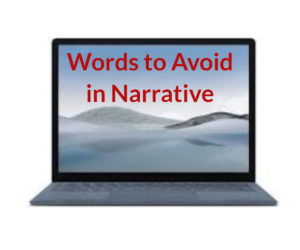 What differentiates the practiced professional from the newbie?
What differentiates the practiced professional from the newbie?
A significant indicator is word choice.
A quick keyword search can tell an editor the level of sophistication in the manuscript they are about to eviscerate.
Consider the following example:
Tom didn’t know that John was coming over. Do you see a problem? Your editor could suggest a correction. Tom didn’t know that John was coming over planning to visit.
The original sentence is grammatically correct, but which is better? What about the removed word ‘that’. We all use vocal inflection or filler words when we speak, but in most cases, those words should be removed from the narrative, but not always. In the dialogue, the word ‘that’ is acceptable as it’s the character speaking.
What about the phrase ‘coming over’ versus ‘planning to visit’. I’ll call it unsophisticated to be polite. Most readers will get the meaning, but your primary writing goal in narration is brevity and clarity. You should pack as much punch into as few words as possible.
Don’t use two meandering sentences where one will do. Don’t use filler and unnecessary words that convey no relevant meaning. Did you see me use the word ‘that’? Was it necessary? What if I wrote instead, ‘Don’t use filler and unnecessary words convey no relevant meaning.’ If ‘that’ affects the meaning or flow, leave it in or rewrite the sentence.
Limiting Modifiers
Limiting Modifiers sound indecisive. Nothing in narration should be tentative or doubtful, “Don just wanted his ball back.” As opposed to, “Don wanted his ball back.” Does the word ‘just’ add to the meaning?
Here are a few more to avoid:
- Almost
- Hardly
- Nearly
- Only
- Merely
When editing, don’t use a search and delete. Use a search and rewrite. Take, for example, the sentence, ‘John almost made it out the door before the house exploded.’ By deleting ‘almost’, the meaning would change to, ‘John made it out the door before the house exploded.’ Here we would rewrite the sentence, ‘John escaped with seconds to spare as the house exploded‘. The word ‘escaped’ is a stronger verb replacing a weak phrase ‘made it out’.
Useless Words Away
‘John clearly didn’t understand Sarah’s point of view’. What value does the word ‘clearly’ offer here? Again, we talk this way, and we would vocally emphasize ‘clearly’ to dramatize that John is clueless, but it doesn’t work for the narrative. Similar words are, actually, basically, literally, really, very, and so. The rule: Anytime you can remove a word from a sentence, and the sentence feels stronger, remove it. If a word adds nothing, it detracts. On a side note, the same rule applies to writing jokes.
Adverbs Don’t Add Much
What is the adverb’s purpose in life? It adds strength to a weak verb. Why not use a strong verb instead? “She ran quickly across the parking lot.” Here, the word ‘ran’ is weak because it doesn’t describe the action well enough, so the writer added ‘quickly’. How about, “She sprinted across the parking lot,” or “She dashed across the parking lot.” The list of adverbs is extensive, and most are associated with the “ly”. Try to never use them, opting for a strong verb instead.
Attention Getters that Get the Wrong Attention
“Suddenly, James spun around,” as opposed to “James spun.” I would also prefer to include the reason for James’s spinning. “James spun to see John stuffing the last cupcake in his mouth.” We also eliminated a useless modifier, “around,” to describe James’s spin. Is it needed? Consider this option. “James pivoted to see John stuffing the last cupcake in his mouth.” Along with the same thought, you don’t sit down or stand up. You sit and stand. “James stood up and walked from the room” can be replaced by “James stood and walked from the room.”
Filtering Words
Filtering words, by definition, are telling, not showing, and we want to show the reader what is taking place. “Once again, Jessica felt her roommates were intentionally leaving her out.” We need to show Jessica feeling left out, not tell. “Jessica arrived at the front entrance as her roommates sped away in John’s car. She kicked the trashcan on her return to her dorm room and prepared for another exciting evening of microwave popcorn.” Instead of telling the reader how Jessica feels, we’re using a visual of Jessica with subtext. The storyline should add to Jessica’s situation.
Other filtering words to eliminate: see, hear, look, think, wonder, realize, watch, seem, notice. Don’t tell the reader what is happening from a distance. The reader wants to walk in your protagonist’s shoes and experience the story firsthand. Filter words separate the reader from the character and eventually from your book.
Please feel free to comment on the series of posts I’ve provided. My experience is what it is. If you have something to add that will help other writers, I greatly encourage all feedback.